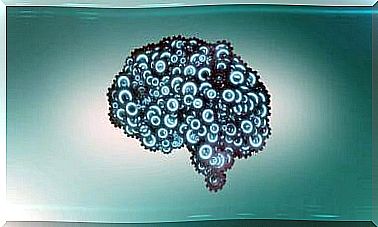Can Mental Illness Be Inherited?

Can mental illness be inherited? This is a question that some of you may have asked yourself at some time, especially if you have family members with a mental disorder. And it is that a multitude of investigations show that certain mental disorders have an important genetic load.
On the other hand , what research has not yet achieved is to decipher all the questions about how this genetic load acts or influences. Science advances slowly. Little by little we are learning more about the hereditary transmission of mental illnesses, although there is still a long way to go.
Today we understand disease, or rather health in general, as a product of the interaction between genetics and the environment. In addition, we know that in many cases what is inherited is not the disease, but the willingness to suffer it.
What factors condition our health?
The appearance of the disease will depend on many factors. This is so even in cases of inheritance of a dominant character. Thus, your whole life may pass without manifesting the disease if predisposing and triggering factors are not present (the spark that lights the fuse that carries the genetic load).
In this way, we speak of probabilities. Thus, there is no certainty that the child of a mentally ill person will manifest the same illness. On the other hand, it can be predicted that the probability of suffering from it will be greater. And if the father and mother have the same disease, the probability increases even more.
Let’s see below what is the probability of inheriting some of the most well-known mental illnesses.

Likelihood of inheriting mental illness: schizophrenia
Schizophrenia is a serious mental illness that affects some brain functions, such as thinking, perception, emotions, and behavior. As for its symptoms, it is included within psychotic disorders, those in which patients lose contact with reality.
An estimated 1% of the population suffers from schizophrenia. It is also estimated, based on different studies, that among the descendants of a schizophrenic father and mother, 40% will manifest the disease. Another 15 percent will have psychic abnormalities, although not the same illness.
Among biviteline twins, the incidence rate is maintained. Among univitelinos, the concordance is 80%. It is considered to be a recessive type of inheritance, with incomplete penetration of the carrier gene or genes.
Likelihood of inheriting bipolar disorder
Bipolar disorder is a serious illness due to the danger and disability associated with it. It is also known as manic-depressive illness or manic depression. People with bipolar disorder are characterized by unusual mood swings. Within mental illnesses, it is one of the most feared.
People with bipolar disorder sometimes feel very happy and “upbeat” and are much more energetic and active than usual. This is called a manic episode. Other times, people with bipolar disorder feel very sad and “depressed,” have low energy, and are much less active than normal. This is known as a depressive episode.
Bipolar disorder is present in 0.4% of the population. The risk of the disease increases when parents have it. Among univitelline twins, the concordance is 95%. It appears to be a dominant type inheritance, with incomplete penetration of the gene.
How likely is it to inherit oligophrenia?
Most profound oligophrenias (80%) are due to exogenous causes. These refer to accidents or diseases in intrauterine life or in early childhood. Therefore, they are not hereditary.
In mild or medium-intensity oligophrenias, 80% are related to heredity. They are children of people with low IQ. When the father and mother are oligophrenic, 80% of the children have mental retardation. Only 40% present it when only the father or mother are oligophrenic.
A negative factor is that oligophrenics often bind to each other and therefore the probability related to genetics skyrockets. This is so because it is very difficult to find pairs in which the distance in CI is very large. The mode of transmission is recessive. Inheriting mental illnesses, such as oligophrenia, is possible, although most are due to exogenous causes.
And what about other mental illnesses like neuroses?
Neuroses are abnormal experiential reactions, the result of circumstances and, therefore, not linked to genetic mass. The overload of neurosis in the same genealogical tree is tried to explain by “false inheritance”. It is a mirage produced as a consequence of “emotional contagion” in a suitable family setting.

There is a hereditary history in 70% of neuroses. Concordances with univitelline twins are 83%. However, they are only 23% in bivitheline twins. Thus, the hypothesis of “emotional contagion” would be questioned.
Within the indisputable psychogeny of neuroses there seems to be a constitutional background. That is, there seems to be a predisposition to react neurotically to pathogenic experiences. As we can see, it is possible to inherit mental illnesses. Some are more likely than others to be inherited. Twin studies and family histories have shown that mental health conditions have a variable genetic contribution.









